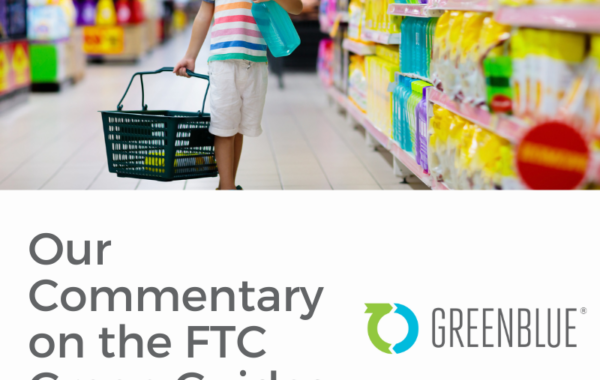May 11, 2021
The first day of SPC Impact 2021, “Driving Towards Meaningful & Long-overdue Bold Change” ended with three main stage sessions. First, SPC Executive Director, Nina Goodrich, shared opening remarks related to various sustainable packaging trends. Audience members then heard from Dr. Ayana Elizabeth Johnson, co-editor of All We Can Save: Truth, Courage, and Solutions for the Climate Crisis. She and Goodrich engaged in a mesmerizing conversation about the book, Dr. Johnson’s career as a marine biologist, and words of encouragement for members of the sustainability industry. Viewers then listened to Ray Cameron, of the world’s largest asset manager, BlackRock. On paper, these two interviewees have starkly different careers, but the takeaways from both conversations made it clear that these individuals fostered the same passion to pursue bold change.
The following insights may surprise you, or you may have predicted some. Overall, the below diversity of solutions are crucial to producing meaningful, bold change that will propel us into a cleaner future.
Nina Goodrich –
- Supporting the FTC recyclability definition and a national recycling strategy is paramount to the success of recycling in the United States.
There is a call for unity of the definitions of recyclability in all fifty states. A fragmented state-by-state approach has caused and will continue to result in consumer confusion, less clear and concise labeling, and available recycling information.
- A plastic bottle is one of the simplest packages to recycle, right?
Goodrich demonstrated how complex a seemingly simple and ubiquitous packaging type actually is through the How2Recycle Labeling Program, which has over 200 labels for plastic bottles alone. Most packages are made of more than one component or commodity material, which creates nuances in recyclability and further entangles an assumed plastic bottle in a binary system to deem it recyclable or not.
- Climate change is the north star for sustainable packaging.
We all want to keep materials out of the environment, and ultimately the goal is to be able to use recycled materials as new manufacturing feedstock. Recycled materials have a lower carbon footprint and create the opportunity to develop more sustainable packaging with recycled content. To support investment in recycled materials and provide chain of custody assurance GreenBlue has developed the Recycled Material Standard (RMS).
Dr. Ayana Elizabeth Johnson –
- It’s not that women or BIPOC aren’t doing work on climate change, it’s that their work is largely unrecognized and underfunded.
There is a magnificent diversity of approaches and areas of expertise that can help the sustainability industry find and execute climate solutions. Look beyond those who are already at the top. The voices of those who are underrepresented in our society are here and ready to be heard.
- Go on a rage hike.
If you are feeling stuck or frustrated with the status quo, your next great inspiration may be calling to you from outside. This is how Dr. Johnson got her inspiration and drive to co-author her novel. So when you get outside, ask yourself, ‘What would it look like for this world to be different’.
- There is a place for you here.
The leading climate activists have gotten us this far, but the industry will need a chorus of voices to push us further to a brighter, cleaner future. In the fight for climate solutions, people need to be welcomed in and encouraged to continue exploring and innovating.
- The ocean is a hero, not just a victim.
As a society we have polluted the ocean with plastic, but think of all the amazing things the ocean does and can do for us. The ocean provides a place for offshore renewable energy and regenerative seaweed and shellfish farming, it provides coastal ecosystems to help protect from storms, it’s ecosystems even absorb carbon. Looking at this massive body of water through a different lens proves that the ocean is the hero and is filled with opportunities for those who seek to heal it.
- Go faster; But also go together.
The work on climate change solutions needs to be accelerated, but it needs to be with each other. A community of people and organizations who have the same motivation to pursue positive change, not just hoping for it, but sparking action and possibilities.
Ray Cameron –
- What if we thought of ESG as GES?
ESG, meaning Environmental, Social, and Governance, generally represents criteria utilized by companies to screen investments that are socially and environmentally responsible. From an investor’s perspective, Governance is absolutely critical to the implementation of environmental and social initiatives. We commonly use ESG as a framework for analyzing corporate social responsibility or sustainability strategy, but how important is it to have a board of directors supporting that work? Make sure to not just prioritize the E and S, because the G is what will drive you from the idea board to the actual implementation of the action.
- Climate change is a risk to investments.
A company with an articulated purpose and a strong sustainability strategy leads to more resiliency. A long-term strategy (think retirement planning) that embraces sustainability (especially plans and mitigates for climate change) tends to have a premium when it comes to investors. Companies that do good should be around for a long time.
Overall, the closing remarks made on SPC Impact 2021 Day One brought the entire theme of the event: Pivot Point for Purpose alive and set a high precedent calling to action individual consumers, companies, and industry to actively listen and transform. What will your next bold actions be?





